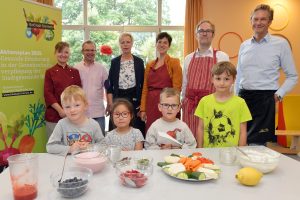Type of Dialogue
Convened by
Language of Dialogue Event
Date/time
To:
City
Geographical focus
Format
Please review the details below for registration information if available or contact the Convenor if you would like to attend.
Curator
Description
Discussion on how a transformation towards sustainable community catering can succeed
Our food system is in a state of upheaval: continuing price pressure, differences in food quality, new social demands and the need for climate-friendly alternatives. Especially in community catering, all these factors are increasingly coming together. With the action plan 2025 – healthy nutrition in communal catering of the municipality of Bremen, the goal was set to increase the quality of catering in public institutions and to change the offer to 100% ecological and, if possible, regional products.
When switching to a healthy and sustainable diet, information on environmentally friendly behaviour in an institution, on climate balances as well as on costing, certification and supporting (technical) offers are relevant in addition to specific questions on food selection and processing. In addition, participants can further educate themselves in motivation and argumentation training as well as in the area of team and external communication.
The target group for the wide range of training courses is primarily the people who work in community catering in the state of Bremen on a daily basis: Cooks, kitchen managers, dishwashers and serving staff. However, facility managers, other employees and educational staff are also welcome. Gastronomes and interested members of the public also have the opportunity to participate.
The CITIES2030 Project Team Bremerhaven invited Jan Kohlmüller from “Forum Küche im Wandel” (Forum Kitchen in Transition) to discuss online with citizens, politicians, administration, farmers and members of the food board Bremerhaven/Cuxland on how a plant based diet with regionsl products can successfully transform community catering. A number of studies show that a very large environmental relief potential can be achieved by reducing the quantity of meat and other animal products offered. However, the concrete implementation of this goal is associated with a multitude of challenges, since meat-containing meals are an important part of German food culture. How the transformation towards meals with fewer animal products in German community catering can succeed is an important question in the context of the transformation to sustainable food systems.
Acknowledgement


